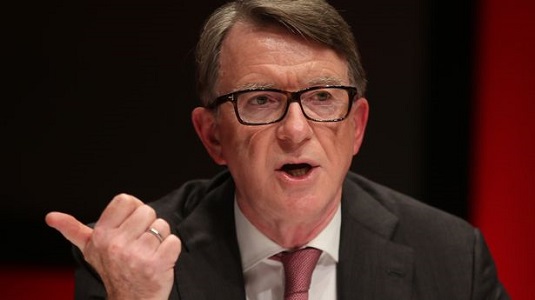
Writing in The Sunday Times, he's ventured a Delphic critique of Keir Starmer's softly-softly strategy. Ostensibly it's a swipe at the left, who are impatient about the lack of radical policies and inspiring vision (leftists, reading The Times, really?). One should not rush into building a New Jerusalem he counsels, especially when people's priorities are "everyday healthcare, schooling, policing and the safety of their neighbourhoods." Note what's missing: standard of living and poor wages. But for Mandelson, most of all Labour should avoid stoking expectations and especially when it has a commanding poll lead, because making a big offer runs the risk of putting people off.
Or does it? According to Peter Mandelson, in the very next sentence he says radical policies need not be off-putting, and that a limited programme isn't necessarily an election winner. Okay. The trick lies not in offering a balance between the two, but offering "boldness" in areas that taps into public support. This doesn't mean tax and spend, it means taking on "vested interests standing in the way of change." Who might he have in mind? Housing is a huge issue, and matters around building new homes, establishing rights for renters, and implementing standards for lets is popular, and requires the taking on of a vested interest to make the lives of millions of people better. You mean like that? Of course not. For Mandelson, being popular means attacking workers - suggesting workers should trade in workplace autonomy for the golden chains of higher pay. Sounds not unlike the useless and long-forgotten shares-for-rights scheme overseen by George Osborne.
Another example of the right radicalism concerns the NHS. The idiocies of his protege Wes Streeting, particularly the desire to "take on" the health professions, is just the electoral tonic Labour needs. This is on top of investing more money in social care, but overall the party needs to be "honest" with voters. Because it's not just about offering a programme that can win an election, but having something in place that can form the basis of a government. I guess Mandelson has forgot that a manifesto, the very thing a party goes into an election with, is a programme for government.
Examples of the "wrong" sort of radicalism, outlined with all the saccharine sweetness of a smiling assassin, are House of Lords reform and tackling climate change. Which happen to be agendas Starmer has chosen to highlight, and are respectively the brain children of Gordon Brown and Ed Miliband respectively. Mandelson asks how many are likely to vote Labour because it wants to abolish the House of Lords? Methinks The Rt Hon. the Lord Mandelson has an interest to declare. The answer, of course, is very few. But since when was New Labour beholden to public opinion, especially when it came to invading Middle Eastern countries? Climate change is a much more serious issue for Mandelson, but it's not a vote winner. Perhaps he'd like to avail himself of YouGov's trackers, among other things before future demonstrations of arrogant ignorance.
What's this about, then? Despite the media going much easier on Starmer than his predecessor, and having put as much distance between himself and the 2019 manifesto while remaining inside the envelope of Labourism, there are still establishment jitters over the Labour leader. Partly, it will be forever thus. The Labour Party as an institute of state is structurally more suspect than the Tories because it remains tied to organised labour, and commands the support of most working age people. The potential for the party to be "unreliable", as it was between 2015 and 2019, does keep some establishment figures up at night. Including not a few ennobled from its own benches, including Mandelson. Second, if Starmer does win and carries out his watered down Green New Deal and constitutional reform programme, some noses will be put out of joint. Worse, it could whet the appetite for more change. And we can't well have that.
Mandelson's intervention is trying to pull Labour into a non-threatening political space. That is, a space that treats establishment interests as sacrosanct and therefore unmolested. But his article is incoherent because, despite himself, he knows Labour have to offer something substantive to win and then diffuse any potential crises of legitimacy - crises the Tories only seem too happy to stoke right now. In trying to face both directions, Mandelson shows up the tensions among his class when even the most mild, most timid reforms are on the table.
Image Credit
Note to Peter Mandelson.
ReplyDeleteI do care if people are fithy rich even if they pay some taxes because their filthy money is used to buy influence, policy and people.
How do we improve "everyday healthcare, schooling, policing and the safety of their neighbourhoods"? Pay workers more so that they can afford what they need, and pay for their training. Not doing so is economic illiteracy. If we have to tax away some surplus cash in the economy then tax the filthy rich first, just as in a war the fittest are asked to sacrifice their lives for the good of the country.
Peter Mandelson may once have had some grasp of strategy to win elections (though probably not - it's easy to predict sunrise at 4am), now he is struggling to pretend to influence.